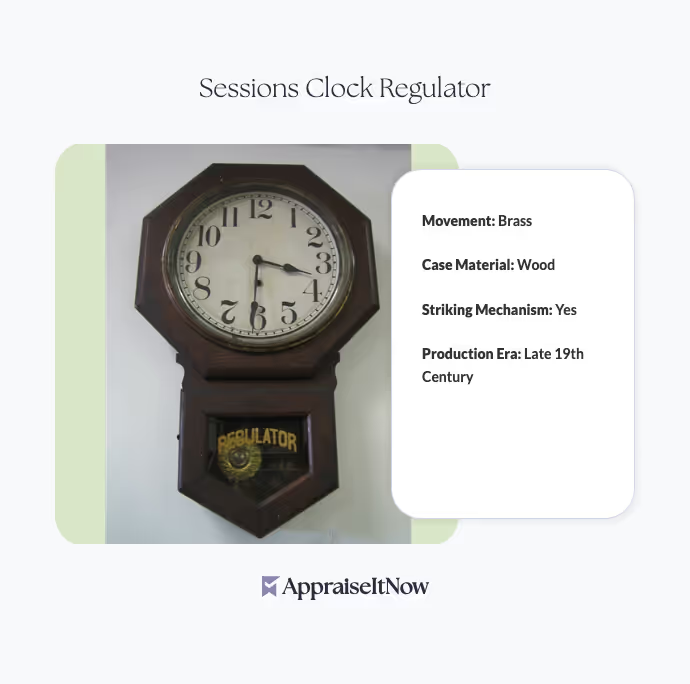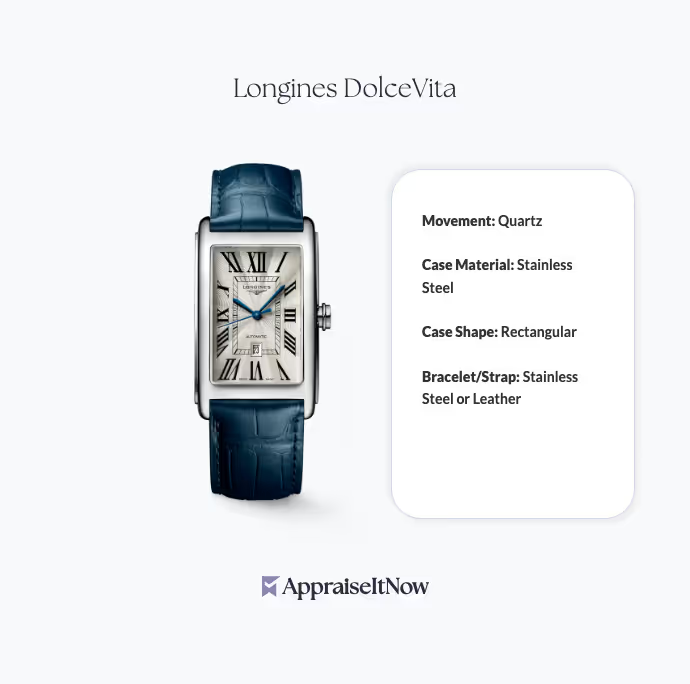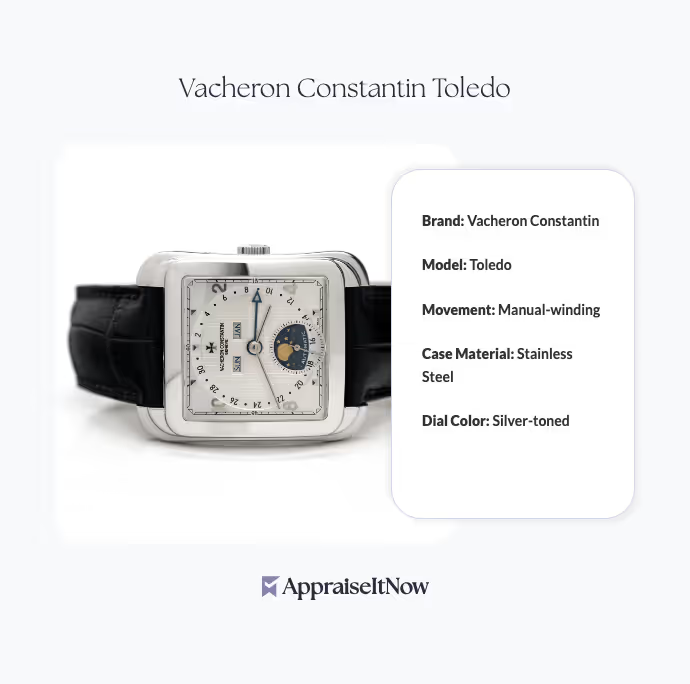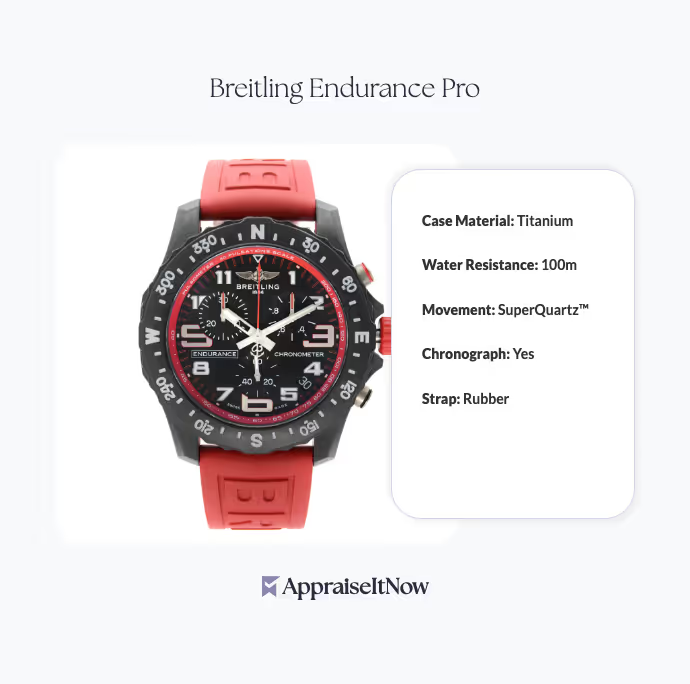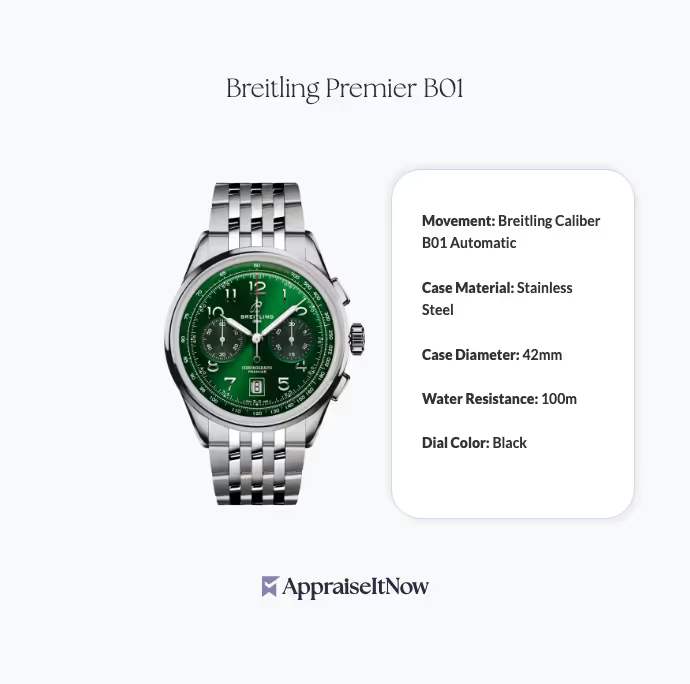<h1>How to Get Your Sessions Clock Regulator Appraised</h1>
<p>If you're considering selling, insuring, or simply valuing a Sessions Clock Regulator, obtaining a professional appraisal is essential. These rare antique timepieces, produced by the <strong>Sessions Clock Company</strong> in the late 19th century, typically command <strong>$250 to $500</strong> in today's collector market—but that price varies significantly based on condition, provenance, and mechanical functionality. Understanding what drives value and how to access qualified appraisers ensures you receive accurate documentation for your horological investment.</p>
<h2>Understanding Sessions Clock Regulator Value Factors</h2>
<p>The Sessions Clock Regulator represents a specific category of institutional timepiece designed for precision and reliability in commercial and institutional settings. Your clock's current worth depends on several interconnected factors that professional appraisers evaluate systematically.</p>
<p><strong>Rarity and production history</strong> form the foundation of Sessions Clock value. First introduced in <strong>1875</strong>, the Sessions Clock Company produced regulators for nearly a century, but each variation carries different market significance. Clocks with original brass movements and ornate wood cases in excellent condition command premium prices because fewer survive in pristine state. When determining how old a Session mantle clock is, appraisers examine construction techniques, materials, and manufacturing marks—these indicators directly correlate to value.</p>
<div class="callout tip"><p><strong>Collector's Insight</strong></p>
<p>Sessions clocks with original striking mechanisms intact and functioning properly can be worth 30-50% more than silent examples, as collectors particularly value the audible heritage.</p></div>
<p>Condition assessment extends beyond visual inspection. Appraisers evaluate whether the internal brass movement maintains original components, whether the case shows refinishing or restoration, and whether the striking mechanism functions properly. A fully operational Sessions regulator with matching serial numbers and authentic patina typically outperforms one requiring restoration, even if the latter has been professionally refurbished.</p>
<h2>Establishing Your Clock's Age and Authenticity</h2>
<p>Many clock owners ask "<em>How can you tell how old a session mantle clock is?</em>" This question points to a critical value consideration—authentication. Sessions Clock Company produced regulators across several design eras, and correctly identifying your clock's vintage requires examining specific features.</p>
<p>Early production models from the 1875-1890 period featured more elaborate wooden cases with detailed carving and heavier brass mechanisms. Later 20th-century production simplified designs while improving reliability. A clock's age directly impacts value because earlier examples demonstrate superior craftsmanship and rarer design elements. Professional appraisers use production records, patent documentation, and manufacturing technique analysis to pinpoint manufacture dates with confidence.</p>
<p>The distinction between Sessions regulators and other antique clock brands matters significantly for valuation. While you might wonder "<em>Are Seth Thomas clocks worth money?</em>" or "<em>Are Herschede clocks valuable?</em>", Sessions clocks occupy their own market niche. Seth Thomas pieces generally command higher prices due to greater production volume recognition, but Sessions regulators appeal to specialists and serious collectors who value their institutional heritage and mechanical sophistication.</p>
<div class="callout note"><p><strong>Authentication Key</strong></p>
<p>Original Sessions Clock Company labels, patent dates stamped on the movement, and consistent wear patterns across all components indicate authentic examples versus later reproductions or heavily modified pieces.</p></div>
<h2>Determining Market Demand and Collector Interest</h2>
<p>The Sessions Clock Regulator market exists within the broader <a href="/types/antiques">antiques</a> collecting sphere, where demand concentrates among horological enthusiasts, interior designers seeking period-authentic pieces, and institutional collectors. Understanding this demand helps explain why "<em>Is there a market for old clocks?</em>" receives an enthusiastic yes—particularly for well-documented examples with clean provenance.</p>
<p>Sessions regulators designed for commercial use appeal to buyers furnishing period-appropriate spaces, museum collections, and time-keeping enthusiasts. Their institutional heritage differentiates them from household mantle clocks, positioning Sessions clocks as specialty pieces rather than common collectibles. This focused but passionate collector base supports steady market values, though dramatic appreciation remains uncommon compared to more celebrated clock makers.</p>
<p>Geographic location affects Sessions Clock Regulator values. East Coast and Midwest collectors, where Sessions Clock Company maintained strongest market presence, typically pay premium prices compared to West Coast markets. Professional appraisers familiar with regional variations provide more accurate valuations than generic online price guides.</p>
<h2>How to Find Qualified Clock Appraisers</h2>
<p>Locating a professional qualified to appraise your Sessions Clock Regulator requires specific criteria. You want an appraiser with demonstrated expertise in <a href="/types/antiques">antiques</a> generally and horological pieces specifically—not general personal property appraisers lacking clock specialization.</p>
<p>The best approach begins with seeking <strong>ISA (International Society of Appraisers)</strong>, <strong>ASA (American Society of Appraisers)</strong>, or <strong>AAA (American Association of Appraisers)</strong> credentials. These organizations maintain standards for <a href="/blog/what-you-need-to-know-about-personal-property-appraisals">personal property appraisals</a> and require members to demonstrate expertise within their specialization. An appraiser holding certification in antiques, decorative arts, or horological items brings credibility and professional accountability to their valuation.</p>
<p><strong>AppraiseItNow</strong> connects you with credentialed appraisers across the U.S. who specialize in <a href="/blog/appraising-antiques-unveiling-the-hidden-treasures-in-your-collection">antique valuations</a>. Our platform streamlines the process—you submit photographs, descriptions, and any available documentation securely online, and qualified experts provide USPAP-compliant reports suitable for insurance, estate planning, or sales purposes.</p>
<p>When evaluating "<em>How to get a clock valued?</em>", avoid relying solely on auction house estimates or dealer quotes. Professional appraisals provide independent, third-party documentation that protects your interests whether buying, selling, or establishing insurance coverage. A certified appraiser's report carries legal weight that casual valuations cannot match.</p>
<h2>Preparing Your Sessions Clock for Appraisal</h2>
<p>Before contacting an appraiser, gather information that will facilitate accurate valuation. Photograph your clock from multiple angles, including close-ups of any maker's marks, patent dates, or identifying labels. Document the current condition honestly—note any repairs, replacements, or restoration work. If you possess original documentation, purchase receipts, or provenance information, compile these materials.</p>
<p>Avoid making alterations to your clock before appraisal. The question "<em>Is it okay to move clock hands backwards?</em>" reflects a common concern—and the answer illustrates why professional guidance matters. Moving hands backwards can damage delicate escapement mechanisms, reducing value and reliability. Let your appraiser assess the clock in its current state; they understand how to safely evaluate functionality without causing harm.</p>
<div class="callout tip"><p><strong>Preparation Tip</strong></p>
<p>Note whether your Sessions regulator's striking mechanism functions, whether all components move freely, and whether the case exhibits original finish or refinishing—this information helps appraisers prioritize their examination.</p></div>
<h2>The Value of USPAP-Compliant Documentation</h2>
<p>A professional appraisal following <strong>USPAP (Uniform Standards of Professional Appraisal Practice)</strong> standards provides documentation that insurance companies, courts, and financial institutions accept without question. If you're appraising your Sessions Clock Regulator for insurance purposes, this documentation protects you in case of loss or damage—insurers require certified appraisals to justify replacement coverage.</p>
<p>Estate planning represents another critical use case. When dividing assets among heirs or establishing trust values, professional appraisals create objective documentation that prevents disputes and simplifies settlement processes. A certified appraiser's independent assessment carries far more authority than family estimates or casual research.</p>
<p>For those wondering "<em>What is the rarest clock?</em>" and considering their Sessions regulator's relative scarcity, professional documentation establishes that rarity in formal records. This creates a foundation for future sales, museum donations, or collection management. The appraisal becomes your clock's official record—its pedigree in paper form.</p>
<h2>Understanding Your Sessions Clock's Market Context</h2>
<p>Sessions Clock Regulators occupy a specific position within the broader timepiece market. When collectors ask "<em>What is the best vintage clock brand?</em>", preferences vary—Waterbury, Seth Thomas, and Ansonia all command dedicated followings. Sessions clocks appeal particularly to those valuing institutional heritage and mechanical complexity over artistic case design.</p>
<p>The market for Sessions regulators remains stable rather than volatile, with consistent demand from niche collectors. Unlike investment-grade art or rare watches valued in <a href="/blog/appraising-luxury-watches-determining-the-value-of-timepiece-investments">luxury timepieces</a>, Sessions clocks appreciate gradually through preservation rather than speculation. This stability makes them reliable holdings for collectors prioritizing mechanical heritage over financial returns.</p>
<p>Professional appraisers understand these market nuances. They recognize that your Sessions Clock Regulator's value derives partly from its functional excellence—the precision mechanisms that allowed it to synchronize time across institutional spaces. This technical sophistication appeals to horological specialists who appreciate engineering excellence independent of aesthetic considerations.</p>
<h2>Maximizing Your Appraisal's Accuracy and Utility</h2>
<p>When you contact an appraiser through <strong>AppraiseItNow</strong>, the process prioritizes accuracy through specialized expertise. Our appraisers examine high-resolution photographs you provide, ask detailed questions about provenance and condition, and research comparable recent sales to establish fair market value. The resulting report documents not just the price estimate but the reasoning behind it—the specific features, market conditions, and comparable transactions that justify the valuation.</p>
<p>This documentation becomes invaluable if disputes arise regarding your clock's worth. Insurance claims, estate settlements, or sales negotiations all benefit from detailed professional reasoning. An appraiser who simply provides a price without explanation creates a hollow document; one who explains the basis for valuation creates a defensible record.</p>
<p>For those asking "<em>How old does a clock have to be to be an antique?</em>", the technical answer is 100+ years, which qualifies most Sessions regulators produced before 1924. Professional appraisers confirm this status and document it formally, which has implications for insurance coverage, sales marketing, and collection categorization.</p>
<div class="callout note"><p><strong>Key Takeaway</strong></p>
<p>A certified appraisal of your Sessions Clock Regulator provides objective, defensible documentation of value that protects your investment whether you're buying, selling, insuring, or planning your estate. Professional expertise ensures accuracy where casual estimates fall short, giving you confidence in your clock's true market worth.</p></div>
